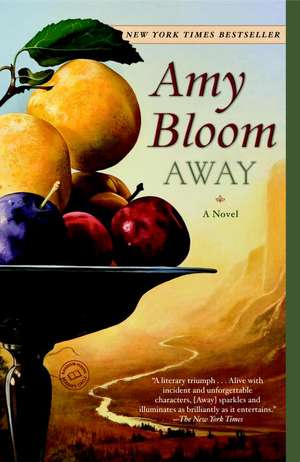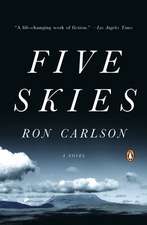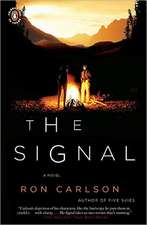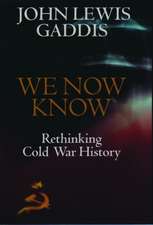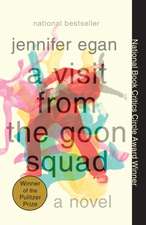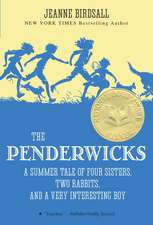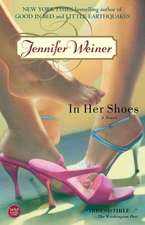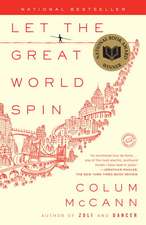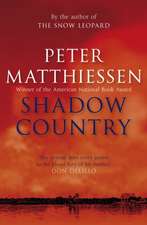Away
Autor Amy Bloomen Limba Engleză Paperback – 31 mai 2008
Vezi toate premiile Carte premiată
Listen Up (2007), IndieFab awards (2007)
| Toate formatele și edițiile | Preț | Express |
|---|---|---|
| Paperback (2) | 50.95 lei 3-5 săpt. | +7.78 lei 5-11 zile |
| GRANTA BOOKS – 2 iun 2008 | 50.95 lei 3-5 săpt. | +7.78 lei 5-11 zile |
| Random House Trade – 31 mai 2008 | 115.12 lei 6-8 săpt. |
Preț: 115.12 lei
Nou
Puncte Express: 173
Preț estimativ în valută:
22.04€ • 23.94$ • 18.52£
22.04€ • 23.94$ • 18.52£
Carte tipărită la comandă
Livrare economică 21 aprilie-05 mai
Preluare comenzi: 021 569.72.76
Specificații
ISBN-13: 9780812977790
ISBN-10: 0812977793
Pagini: 247
Dimensiuni: 141 x 203 x 14 mm
Greutate: 0.2 kg
Editura: Random House Trade
ISBN-10: 0812977793
Pagini: 247
Dimensiuni: 141 x 203 x 14 mm
Greutate: 0.2 kg
Editura: Random House Trade
Notă biografică
Amy Bloom is the author of Come to Me, a National Book Award finalist; A Blind Man Can See How Much I Love You, nominated for the National Book Critics Circle Award; Love Invents Us; and Normal. Her stories have appeared in Best American Short Stories, O. Henry Prize Short Stories, The Scribner Anthology of Contemporary Short Fiction, and many other anthologies here and abroad. She has written for The New Yorker, The New York Times Magazine, The Atlantic Monthly, Vogue, Slate, and Salon, among other publications, and has won a National Magazine Award. Bloom teaches creative writing at Yale University.
From the Hardcover edition.
From the Hardcover edition.
Extras
Chapter 1
And Lost There, a Golden Feather in a Foreign, Foreign Land
It is always like this: the best parties are made by people in trouble.
There are one hundred and fifty girls lining the sidewalk outside the Goldfadn Theatre. They spill into the street and down to the corners and Lillian Leyb, who has spent her first thirty-five days in this country ripping stitches out of navy silk flowers until her hands were dyed blue, thinks that it is like an all-girl Ellis Island: American-looking girls chewing gum, kicking their high heels against the broken pavement, and girls so green they’re still wearing fringed brown shawls over their braided hair. The street is like her village on market day, times a million. A boy playing a harp; a man with an accordion and a terrible, patchy little animal; a woman selling straw brooms from a basket strapped to her back, making a giant fan behind her head; a colored man singing in a pink suit and black shoes with pink spats; and tired women who look like women Lillian would have known at home in Turov, smiling at the song, or the singer. Some of the girls hold red sparklers in their hands and swing one another around the waist. A big girl with black braids plays the tambourine. A few American-looking girls make a bonfire on the corner, poking potatoes in and out of it. Two older women, pale and dark-eyed, are pulling along their pale, dark-eyed children. That’s a mistake, Lillian thinks. They should ask a neighbor to watch the children. Or just leave the children in Gallagher’s Bar and Grille at this point and hope for the best, but that’s the kind of thing you say when you have no child. Lillian makes herself smile at the children as she walks past the women; they reek of bad luck.
Lillian is lucky. Her father had told her so; he told everyone after she fell in the Pripiat twice and didn’t drown and didn’t die of pneumonia. He said that smart was good (and Lillian was smart, he said) and pretty was useful (and Lillian was pretty enough) but lucky was better than both of them put together. He had hoped she’d be lucky her whole life, he said, and she had been, at the time.
He also said, You make your own luck, and Lillian takes Judith, the only girl she knows, by the hand and they push their way through the middle of the crowd and then to the front. They are pushed themselves, then, into the place they want to be, the sewing room of the Goldfadn Theatre. They find themselves inches away from a dark, angry woman with a tight black bun (“Litvak,” Judith says immediately; her mother was a Litvak).
Suddenly, there are two men right in front of them, who, even the greenest girls can see, are stars in the firmament of life, visitors from a brighter, more beautiful planet. Mr. Reuben Burstein, owner of the Goldfadn and the Bartelstone theaters, the Impresario of Second Avenue, with his barrel chest and black silk vest and gray hair brushed back like Beethoven’s. And his son, Mr. Meyer Burstein, the Matinee Idol, the man whose Yankl in The Child of Nature was so tragically handsome, so forceful a dancer, so sweet a tenor, that when he romanced the gentile Russian girl Natasha, women in the audience wept as if their husbands had abandoned them, and when Yankl killed himself, unwilling to marry poor pregnant Natasha and live as a Christian, everyone wept, not unhappily, at his beautiful, tortured death. Meyer Burstein is taller than his father, with a smart black fedora, a cigarette, and no vest over his silk shirt.
The two men move through the crowd like gardeners inspecting the flower beds of English estates, like plantation owners on market day. Whatever it is like, Lillian doesn’t care. She will be the flower, the slave, the pretty thing or the despised and necessary thing, as long as she is the thing chosen from among the other things.
Mr. Burstein the elder stands close to Lillian and makes an announcement. His voice is such a pleasure to listen to that the girls stand there like fools, some of them with tears in their eyes at its gathering, thunderous quality, even as he is merely telling them that Miss Morris (the Litvak) will pass around a clipboard and they are to write down their names and their skills, or have someone write this down for them, and then Miss Morris will interview them all and indicate who should return tomorrow evening for more interviewing. There is a murmur at this; it was not so easy to get away for even one night, and Lillian thinks that the bad-luck mothers and the women who look as if they’ve walked from Brooklyn will not be back.
Miss Morris approaches Lillian. Judith and Lillian have rehearsed for this moment. “Very well, thank you,” if the question seems to be about her health; “I am a seamstress—my father was a tailor,” if the question contains the words “sew,” “costume,” or “work”; “I attend night classes,” said with a dazzling smile in response to any question she doesn’t understand. Judith will get the job. Things being what they are, Lillian knows that a girl who can sew and speak English is a better choice than a girl who just got here and can barely do either.
Lillian studies the profile of Reuben Burstein; the impresario looks like a man from home. She heard his big, burnished voice, and like a small mark on a cheek, like a tilt in the little finger of a hand injured a long time ago, the tilt and the injury both forgotten, underneath she heard Yiddish.
Lillian moves. She presses close to Reuben Burstein and says, “My name is Lillian Leyb. I speak Yiddish very well, as you can hear, and I also speak Russian very well.” She digs her nails into her palms and switches into Russian. “If you prefer it. My English is coming along.” She adds in Yiddish, “Az me muz, ken men,” which is “When one must, one can.” When Reuben Burstein smiles, she adds, “And I am fluent in sewing of every kind.”
The Bursteins look at her. Miss Morris, who did have a Lithuanian mother but was born right here on the Lower East Side and graduated from the eighth grade and speaks standard Brooklyn English, also looks at Lillian, without enthusiasm. The crowd of women look at her as if she has just hoisted up her skirt to her waist and shown her bare bottom to the world; it is just that vulgar, that embarrassing, that effective.
The elder Mr. Burstein moves closer to Lillian. “Bold,” he says and he holds her chin in his hand like he will kiss her on the mouth. “Bold. Bold is good.” He waves his other hand toward Miss Morris, who tells all the women to form groups of four, to make it easier for her to speak to them. There are immediately fifteen groups of four. Lillian loses sight of Judith. She feels like a dog leaping over the garden wall. She smiles up at Reuben Burstein; she smiles at Meyer Burstein; she smiles, for good measure, at Miss Morris. Lillian has endured the murder of her family, the loss of her daughter, Sophie, an ocean crossing like a death march, intimate life with strangers in her cousin Frieda’s two rooms, smelling of men and urine and fried food and uncertainty and need. Just so, she thinks, and she smiles at these three people, the new king and queen and prince of her life, as if she has just risen from a soft, high feather bed to enjoy an especially pretty morning.
Reuben Burstein says in Yiddish, “Come back tomorrow morning, clever pussycat.” Meyer Burstein says, “Really, miss, how is your English?” And Lillian says, very carefully, “I attend night classes.” She pauses and adds, “And they go very well, thank you.”
It had taken eight hours for Lillian to get from Ellis Island to the Battery Park of Manhattan and another four to find Cousin Frieda’s apartment building. She had read Cousin Frieda’s letter and the directions to Great Jones Street while she stood on three different lines in the Registry Room, while the doctor watched them all climb the stairs, looking for signs of lameness or bad hearts or feeblemindedness. (“You step lively,” a man had said to her on the crossing. “They don’t want no idiots in America. Also,” and he showed Lillian a card with writing on it, “if you see something that looks like this, scratch your right ear.” Lillian tried to memorize the shape of the letters. “What does it say?” “What do you think? It says, ‘Scratch your right ear.’ You do that, they think you can read English. My brother sent me this,” the man said and he put the card back in his pocket, like a man with money.)
They had room, Cousin Frieda’s letter had said, for family or dear friends. They had a little sewing business and could provide employment while people got on their feet. It was a great country, she wrote. Anyone could buy anything—you didn’t have to be gentry. There was a list of things Frieda had bought recently: a sewing machine (on installment but she had it already), white flour in paper sacks, condensed milk, sweet as cream and didn’t go bad, Nestlé’s powdered cocoa for a treat in the evening, hairpins that matched her hair color exactly, very good stockings, only ten cents. They had things here that people in Turov couldn’t even imagine.
Lillian had walked through the last door, marked push to new york, and showed her letter to a man moving luggage onto the ferry. He smiled and shrugged. She held up the letter and the block-printed address a dozen times to faces that were blank, or worse than blank, knowing and dubious; she held it up, without much hope, to people who could not themselves read and pushed her aside as if she’d insulted them. She hadn’t imagined that in front of her new home, in her new country—after the trolley cars and the men with signs on their fronts and their backs, the women in short skirts, the colored boys with chairs on their backs and pictures of shiny shoes around their necks, and a team, an old man in red pants working with a young girl with a red hat, selling shoelaces, fans, pencils, and salted twists of dough, which smelled so good, Lillian had to cover her mouth and swallow hard—the first thing she would see when she finally got to Great Jones Street was a woman in her nightgown and a man’s overcoat, weeping. Lillian watched the woman open a folding chair and take a china plate from her pocket and hold it on her lap. People passed by and put a few coins in the plate.
Cousin Frieda had run down the stairs and hugged Lillian. “Dear little Lillian,” she said. “My home is your home.” Frieda was thirty. Lillian remembered her from a family wedding when Frieda took her into the woods and they picked wild raspberries until it was dark. Lillian watched the woman across the street, sitting stock-still in the chair, tears flowing down her face onto her large, loose breasts, dripping onto the plate with the coins.
“Eviction,” Frieda said. “You can’t pay, you can’t stay.” She said in Yiddish, “Es iz shver tzu makhen a leben.” It’s hard to make a living.
She wanted to make sure Lillian understood. She didn’t want Lillian to be frightened, she said, everything would work out fine between them, but Lillian should see, right away, how it’s nothing to go from having a home, which Lillian does now, with her cousin Frieda, to having no home at all, like the woman over there who was thrown out this morning. Lillian did see.
Frieda took Lillian by the hand and crossed the street. She put a penny in the plate and said, “I’m sorry, Mrs. Lipkin.” Taking Lillian up the stairs to her apartment, Frieda said to Lillian, “Poor thing,” and she gestured over her shoulder to a small room filled with a bed and two wooden crates. “You share with Judith.”
The lesson of Mrs. Lipkin was not lost on Lillian, still holding everything she had in Yitzak Nirenberg’s leather satchel.
It’s always the same dream. She’s dead. She’s blind, too. All she can see is a bursting red inside her eyelids, as if she’s on her back in Turov’s farthest field on the brightest day in June, closing her eyes to the midday sun. The entire world, the trees, the birds, the chimneys, has disappeared; there’s nothing but a gently falling white sky, which becomes her bedsheet. A straw pokes through to her cheek and she brushes it away and feels dried blood on her face. She rubs her eyes and feels the strings of blood that were closing her lids. They roll down her cheeks and into her mouth, solid bits of blood, hard as peppercorns, softening on her tongue, and she spits them into her hand and her hands turn red.
She sees everything now, in all directions. The red floor. Her husband lying in the doorway, covered in blood so thick his nightshirt is black and stiff with it. There are things on the floor between them: her grandmother’s teapot in four pieces, the bucket, standing on its mouth, the cloth they hung for privacy. A hand. Her mother is lying on the floor, too, gutted like a chicken through her apron, which falls like a rough curtain on either side of her. Lillian stands naked in the red room and the color recedes, like the tide.
Her father lies at the front door, facedown, still holding his cleaver against the intruders. His own ax is deep in the back of his neck. Her daughter’s little bed is empty. Another hand is on the floor beside it, and she can see the thin gold line of Osip’s wedding band.
Lillian screams herself awake.
Judith says, “Bad dreams.”
Lillian nods her head and Judith says, sensibly and not unkindly, “You don’t have to tell me.”
And Lillian doesn’t tell her that she’d heard the men whisper beneath their bedroom window, that the walls of the house had been so thin in places, she heard a man cough on the other side of the wall and another man sigh and it seems to Lillian that she had stopped breathing. Little Sophie lay on her stomach, dreaming, sucking on the corner of the quilt. The men put their shoulders to the door, hard, and Lillian reached for Sophie. The walls rocked violently, holding on to the door, but it was an old house, old wood, old mud, all pitted with holes as long and thick as pencils, and plaster began to fall from around the door. The wall would give way in just a minute.
From the Hardcover edition.
And Lost There, a Golden Feather in a Foreign, Foreign Land
It is always like this: the best parties are made by people in trouble.
There are one hundred and fifty girls lining the sidewalk outside the Goldfadn Theatre. They spill into the street and down to the corners and Lillian Leyb, who has spent her first thirty-five days in this country ripping stitches out of navy silk flowers until her hands were dyed blue, thinks that it is like an all-girl Ellis Island: American-looking girls chewing gum, kicking their high heels against the broken pavement, and girls so green they’re still wearing fringed brown shawls over their braided hair. The street is like her village on market day, times a million. A boy playing a harp; a man with an accordion and a terrible, patchy little animal; a woman selling straw brooms from a basket strapped to her back, making a giant fan behind her head; a colored man singing in a pink suit and black shoes with pink spats; and tired women who look like women Lillian would have known at home in Turov, smiling at the song, or the singer. Some of the girls hold red sparklers in their hands and swing one another around the waist. A big girl with black braids plays the tambourine. A few American-looking girls make a bonfire on the corner, poking potatoes in and out of it. Two older women, pale and dark-eyed, are pulling along their pale, dark-eyed children. That’s a mistake, Lillian thinks. They should ask a neighbor to watch the children. Or just leave the children in Gallagher’s Bar and Grille at this point and hope for the best, but that’s the kind of thing you say when you have no child. Lillian makes herself smile at the children as she walks past the women; they reek of bad luck.
Lillian is lucky. Her father had told her so; he told everyone after she fell in the Pripiat twice and didn’t drown and didn’t die of pneumonia. He said that smart was good (and Lillian was smart, he said) and pretty was useful (and Lillian was pretty enough) but lucky was better than both of them put together. He had hoped she’d be lucky her whole life, he said, and she had been, at the time.
He also said, You make your own luck, and Lillian takes Judith, the only girl she knows, by the hand and they push their way through the middle of the crowd and then to the front. They are pushed themselves, then, into the place they want to be, the sewing room of the Goldfadn Theatre. They find themselves inches away from a dark, angry woman with a tight black bun (“Litvak,” Judith says immediately; her mother was a Litvak).
Suddenly, there are two men right in front of them, who, even the greenest girls can see, are stars in the firmament of life, visitors from a brighter, more beautiful planet. Mr. Reuben Burstein, owner of the Goldfadn and the Bartelstone theaters, the Impresario of Second Avenue, with his barrel chest and black silk vest and gray hair brushed back like Beethoven’s. And his son, Mr. Meyer Burstein, the Matinee Idol, the man whose Yankl in The Child of Nature was so tragically handsome, so forceful a dancer, so sweet a tenor, that when he romanced the gentile Russian girl Natasha, women in the audience wept as if their husbands had abandoned them, and when Yankl killed himself, unwilling to marry poor pregnant Natasha and live as a Christian, everyone wept, not unhappily, at his beautiful, tortured death. Meyer Burstein is taller than his father, with a smart black fedora, a cigarette, and no vest over his silk shirt.
The two men move through the crowd like gardeners inspecting the flower beds of English estates, like plantation owners on market day. Whatever it is like, Lillian doesn’t care. She will be the flower, the slave, the pretty thing or the despised and necessary thing, as long as she is the thing chosen from among the other things.
Mr. Burstein the elder stands close to Lillian and makes an announcement. His voice is such a pleasure to listen to that the girls stand there like fools, some of them with tears in their eyes at its gathering, thunderous quality, even as he is merely telling them that Miss Morris (the Litvak) will pass around a clipboard and they are to write down their names and their skills, or have someone write this down for them, and then Miss Morris will interview them all and indicate who should return tomorrow evening for more interviewing. There is a murmur at this; it was not so easy to get away for even one night, and Lillian thinks that the bad-luck mothers and the women who look as if they’ve walked from Brooklyn will not be back.
Miss Morris approaches Lillian. Judith and Lillian have rehearsed for this moment. “Very well, thank you,” if the question seems to be about her health; “I am a seamstress—my father was a tailor,” if the question contains the words “sew,” “costume,” or “work”; “I attend night classes,” said with a dazzling smile in response to any question she doesn’t understand. Judith will get the job. Things being what they are, Lillian knows that a girl who can sew and speak English is a better choice than a girl who just got here and can barely do either.
Lillian studies the profile of Reuben Burstein; the impresario looks like a man from home. She heard his big, burnished voice, and like a small mark on a cheek, like a tilt in the little finger of a hand injured a long time ago, the tilt and the injury both forgotten, underneath she heard Yiddish.
Lillian moves. She presses close to Reuben Burstein and says, “My name is Lillian Leyb. I speak Yiddish very well, as you can hear, and I also speak Russian very well.” She digs her nails into her palms and switches into Russian. “If you prefer it. My English is coming along.” She adds in Yiddish, “Az me muz, ken men,” which is “When one must, one can.” When Reuben Burstein smiles, she adds, “And I am fluent in sewing of every kind.”
The Bursteins look at her. Miss Morris, who did have a Lithuanian mother but was born right here on the Lower East Side and graduated from the eighth grade and speaks standard Brooklyn English, also looks at Lillian, without enthusiasm. The crowd of women look at her as if she has just hoisted up her skirt to her waist and shown her bare bottom to the world; it is just that vulgar, that embarrassing, that effective.
The elder Mr. Burstein moves closer to Lillian. “Bold,” he says and he holds her chin in his hand like he will kiss her on the mouth. “Bold. Bold is good.” He waves his other hand toward Miss Morris, who tells all the women to form groups of four, to make it easier for her to speak to them. There are immediately fifteen groups of four. Lillian loses sight of Judith. She feels like a dog leaping over the garden wall. She smiles up at Reuben Burstein; she smiles at Meyer Burstein; she smiles, for good measure, at Miss Morris. Lillian has endured the murder of her family, the loss of her daughter, Sophie, an ocean crossing like a death march, intimate life with strangers in her cousin Frieda’s two rooms, smelling of men and urine and fried food and uncertainty and need. Just so, she thinks, and she smiles at these three people, the new king and queen and prince of her life, as if she has just risen from a soft, high feather bed to enjoy an especially pretty morning.
Reuben Burstein says in Yiddish, “Come back tomorrow morning, clever pussycat.” Meyer Burstein says, “Really, miss, how is your English?” And Lillian says, very carefully, “I attend night classes.” She pauses and adds, “And they go very well, thank you.”
It had taken eight hours for Lillian to get from Ellis Island to the Battery Park of Manhattan and another four to find Cousin Frieda’s apartment building. She had read Cousin Frieda’s letter and the directions to Great Jones Street while she stood on three different lines in the Registry Room, while the doctor watched them all climb the stairs, looking for signs of lameness or bad hearts or feeblemindedness. (“You step lively,” a man had said to her on the crossing. “They don’t want no idiots in America. Also,” and he showed Lillian a card with writing on it, “if you see something that looks like this, scratch your right ear.” Lillian tried to memorize the shape of the letters. “What does it say?” “What do you think? It says, ‘Scratch your right ear.’ You do that, they think you can read English. My brother sent me this,” the man said and he put the card back in his pocket, like a man with money.)
They had room, Cousin Frieda’s letter had said, for family or dear friends. They had a little sewing business and could provide employment while people got on their feet. It was a great country, she wrote. Anyone could buy anything—you didn’t have to be gentry. There was a list of things Frieda had bought recently: a sewing machine (on installment but she had it already), white flour in paper sacks, condensed milk, sweet as cream and didn’t go bad, Nestlé’s powdered cocoa for a treat in the evening, hairpins that matched her hair color exactly, very good stockings, only ten cents. They had things here that people in Turov couldn’t even imagine.
Lillian had walked through the last door, marked push to new york, and showed her letter to a man moving luggage onto the ferry. He smiled and shrugged. She held up the letter and the block-printed address a dozen times to faces that were blank, or worse than blank, knowing and dubious; she held it up, without much hope, to people who could not themselves read and pushed her aside as if she’d insulted them. She hadn’t imagined that in front of her new home, in her new country—after the trolley cars and the men with signs on their fronts and their backs, the women in short skirts, the colored boys with chairs on their backs and pictures of shiny shoes around their necks, and a team, an old man in red pants working with a young girl with a red hat, selling shoelaces, fans, pencils, and salted twists of dough, which smelled so good, Lillian had to cover her mouth and swallow hard—the first thing she would see when she finally got to Great Jones Street was a woman in her nightgown and a man’s overcoat, weeping. Lillian watched the woman open a folding chair and take a china plate from her pocket and hold it on her lap. People passed by and put a few coins in the plate.
Cousin Frieda had run down the stairs and hugged Lillian. “Dear little Lillian,” she said. “My home is your home.” Frieda was thirty. Lillian remembered her from a family wedding when Frieda took her into the woods and they picked wild raspberries until it was dark. Lillian watched the woman across the street, sitting stock-still in the chair, tears flowing down her face onto her large, loose breasts, dripping onto the plate with the coins.
“Eviction,” Frieda said. “You can’t pay, you can’t stay.” She said in Yiddish, “Es iz shver tzu makhen a leben.” It’s hard to make a living.
She wanted to make sure Lillian understood. She didn’t want Lillian to be frightened, she said, everything would work out fine between them, but Lillian should see, right away, how it’s nothing to go from having a home, which Lillian does now, with her cousin Frieda, to having no home at all, like the woman over there who was thrown out this morning. Lillian did see.
Frieda took Lillian by the hand and crossed the street. She put a penny in the plate and said, “I’m sorry, Mrs. Lipkin.” Taking Lillian up the stairs to her apartment, Frieda said to Lillian, “Poor thing,” and she gestured over her shoulder to a small room filled with a bed and two wooden crates. “You share with Judith.”
The lesson of Mrs. Lipkin was not lost on Lillian, still holding everything she had in Yitzak Nirenberg’s leather satchel.
It’s always the same dream. She’s dead. She’s blind, too. All she can see is a bursting red inside her eyelids, as if she’s on her back in Turov’s farthest field on the brightest day in June, closing her eyes to the midday sun. The entire world, the trees, the birds, the chimneys, has disappeared; there’s nothing but a gently falling white sky, which becomes her bedsheet. A straw pokes through to her cheek and she brushes it away and feels dried blood on her face. She rubs her eyes and feels the strings of blood that were closing her lids. They roll down her cheeks and into her mouth, solid bits of blood, hard as peppercorns, softening on her tongue, and she spits them into her hand and her hands turn red.
She sees everything now, in all directions. The red floor. Her husband lying in the doorway, covered in blood so thick his nightshirt is black and stiff with it. There are things on the floor between them: her grandmother’s teapot in four pieces, the bucket, standing on its mouth, the cloth they hung for privacy. A hand. Her mother is lying on the floor, too, gutted like a chicken through her apron, which falls like a rough curtain on either side of her. Lillian stands naked in the red room and the color recedes, like the tide.
Her father lies at the front door, facedown, still holding his cleaver against the intruders. His own ax is deep in the back of his neck. Her daughter’s little bed is empty. Another hand is on the floor beside it, and she can see the thin gold line of Osip’s wedding band.
Lillian screams herself awake.
Judith says, “Bad dreams.”
Lillian nods her head and Judith says, sensibly and not unkindly, “You don’t have to tell me.”
And Lillian doesn’t tell her that she’d heard the men whisper beneath their bedroom window, that the walls of the house had been so thin in places, she heard a man cough on the other side of the wall and another man sigh and it seems to Lillian that she had stopped breathing. Little Sophie lay on her stomach, dreaming, sucking on the corner of the quilt. The men put their shoulders to the door, hard, and Lillian reached for Sophie. The walls rocked violently, holding on to the door, but it was an old house, old wood, old mud, all pitted with holes as long and thick as pencils, and plaster began to fall from around the door. The wall would give way in just a minute.
From the Hardcover edition.
Recenzii
Praise for Away
PRAISE FOR AWAY
“AWAY is a modest name for a book as gloriously transporting as Amy Bloom’s new novel. Alive with incident and unforgettable characters, it sparkles and illuminates as brilliantly as it entertains… AWAY is a literary triumph, a book-club must and a popular novel destined for wide readership. It is accessible to the point of pure enthrallment without compromising its eloquence or thematic strength. Yet it is also a classic page-turner, one that delivers a relentlessly good read.”
–NEW YORK TIMES
“Amy Bloom knows the urgency of love. As a practicing psychotherapist, she must have heard that urgency in her patients’ stories, and in 1993 when she broke onto the literary scene with Come To Me, we heard it in hers. She has never strayed from that theme…Bloom writes with extraordinary care about people caught in emotional and physical crosswinds: desires they can’t satisfy, illnesses they can’t survive, and–always–love that exceeds the boundaries of this world…this whole novel reads like dry wood bursting into flame: desperate and impassioned, erotic and moving–absolutely hypnotic.”
–COVER OF WASHINGTON POST BOOK WORLD
“With her sly sense of humor and flair for precise, elegant language, acclaimed author Bloom fashions a spellbinding story of courage and unwavering optimism in the face of daunting odds.”
–PEOPLE
“Her execution is exquisite, and exquisite execution is rare–not only in books but (alas) in almost any undertaking…The pleasures of AWAY are the ordinary pleasures of extraordinary novels: finely wrought prose, vivid characters, delectable details. There’s a soft-smile, along-the-way humor…A practicing psychotherapist, this author combines eloquence with insight.”
–COVER OF THE LOS ANGELES TIMES BOOK WORLD
“By the end of this memorable, panoramic novel, Bloom transforms the musts in Lillian’s life into a Scheherazade-like procession of cans that encapsulate all the cultural richness that newcomers contributed to this nation of immigrants in the early part of the 20th century. Grade: A”
–ENTERTAINMENT WEEKLY
“Far and away one of the best books of the year… Once in a great while, a work of art–a poem, a painting, a book–will register in the chest cavity, producing an ache of recognition and pleasure. AWAY by Amy Bloom is such a book… a surprising, tough and incandescent book.”
–CLEVELAND PLAIN DEALER
“Amy Bloom is blessed with a generous heart and a brilliant imagination, which is evident once again in her fifth and best book so far, AWAY…The vividness and tenderness with which Bloom tells this story is stunning. Bloom, who teaches writing at Yale University and is also a practicing psychotherapist, has an innate understanding of the complexity of the human heart and in Lillian, she has created her most compelling character yet.”
–HARTFORD COURANT
“So vivid and engaging, so delicious in tone, that a reader experiences an immediate thrill, the all-too-rare one that signals: I am in excellent hands here… The language that Bloom employs to tell Lillian’s story is immediate, colorful, and unafraid to be plain…It’s not easy to be lyrical, funny, and brilliant all at once, and Bloom is.”
–BOSTON GLOBE
“Rousing, utterly absorbing… a compact epic, an adventure story, a survival tale and an incredible journey wrapped up in a historical novel cloaked in a love story… exquisitely unsentimental novel about exile, hope and love in its various incarnations — maternal, romantic, sexual, platonic, inconvenient, unruly, unreasonable, abiding.”
–SAN FRANCISCO CHRONICLE
“A powerful new novel of loss and love, of hope and struggle…amazing…AWAY is a short novel, but it feels packed to the rafters with fully-realized character, with America, with all the things that don’t fit inside the vessel we’ve taken to calling the American Dream…unforgettable.”
–LOUISVILLE COURIER JOURNAL
“Blom executes Lillian’s tale with the same fresh eye with which a master cinematographer captures a familiar landscape…In just 248 pages of astonishing prose, Bloom covers vast emotional (and geographic) terrain, giving a familiar story epic proportions.”
–NEW YORK DAILY NEWS
“Fascinating…a tough, engaging book.”
–PITTSBURGH POST-GAZETTE
“Outstanding…A sweeping saga of endurance and rebirth. Encompassing prison, prostitution and poetry, Yiddish humor and Yukon settings, Bloom’s tale offers linguistic twists, startling imagery, sharp wit and a compelling vision of the past. Bloom has created an extraordinary range of characters, settings and emotions. Absolutely stunning.”
–PUBLISHERS WEEKLY, STARRED REVIEW
“Summary doesn’t do justice to this compact epic’s richness of episode and characterization, nor to the exemplary skill with which Bloom increases her story’s resonance through dramatic foreshadowing of what lies ahead for her grifters and whores and romantic visionaries and stubborn, hard-bitten adventurers. Echoes of Ragtime, Cold Mountain and Irving Howe’s World of Our Fathers, in an amazingly dense, impressively original novel.”
– KIRKUS REVIEWS, STARRED REVIEW
“A masterly second novel…the writing is spare and tender, with revelatory doses of irony….A novel this gorgeous doesn’t need humor, but what’s better than laughing off a good cry? AWAY is a story to sink your heart into.”
–Elle Magazine
“Bloom attempts a sweeping historical epic and succeeds…Haunting.”
–More Magazine
“A novel laced with heartache, but also a strong thread of hope.”
–O Magazine
“This beautiful, effulgent book sped me forward word by word, out of the room I was in and into Amy Bloom’s world. This is a wonderful novel, a cosmos that transcends its time period and grabs us without compromise. Lillian’s astonishing journey, driven by a mother’s love, will be with me for a long, long time.”
–Ron Carlson, author of The Speed of Light
“I haven’t read a novel in a long time that I genuinely wanted to get back to, just to sit down and read for the pure joy of it. Away is a book full of tender wisdom, brawling insight, sharp-edged humor and–if it’s possible–a lovely, wayward precision. Amy Bloom has created an unforgettable cast of characters. Lillian, the heroine, or anti-heroine, somehow always manages to do what great journeys always do–continue. A marvelous book.”
–Colum McCann, author of Zoli
“Raunchy, funny, and touching, Away is an elegant window into the perils of self-invention and reinvention in New York in the 1920s. Amy Bloom’s heroine, Lillian, is an unforgettable young woman on a quest to make her life whole and to belong in an unstable, yet fascinating, new American world.”
–Caryl Phillips, author of A Distant Shore
“Amy Bloom’s work has always revolved around what love and desire can make us do. In Away, she paints filial love on an immense geographic and historical canvas. The result, a story of loss and survival, is gripping.”
–Christopher Tilghman, author of Roads of the Heart
From the Hardcover edition.
PRAISE FOR AWAY
“AWAY is a modest name for a book as gloriously transporting as Amy Bloom’s new novel. Alive with incident and unforgettable characters, it sparkles and illuminates as brilliantly as it entertains… AWAY is a literary triumph, a book-club must and a popular novel destined for wide readership. It is accessible to the point of pure enthrallment without compromising its eloquence or thematic strength. Yet it is also a classic page-turner, one that delivers a relentlessly good read.”
–NEW YORK TIMES
“Amy Bloom knows the urgency of love. As a practicing psychotherapist, she must have heard that urgency in her patients’ stories, and in 1993 when she broke onto the literary scene with Come To Me, we heard it in hers. She has never strayed from that theme…Bloom writes with extraordinary care about people caught in emotional and physical crosswinds: desires they can’t satisfy, illnesses they can’t survive, and–always–love that exceeds the boundaries of this world…this whole novel reads like dry wood bursting into flame: desperate and impassioned, erotic and moving–absolutely hypnotic.”
–COVER OF WASHINGTON POST BOOK WORLD
“With her sly sense of humor and flair for precise, elegant language, acclaimed author Bloom fashions a spellbinding story of courage and unwavering optimism in the face of daunting odds.”
–PEOPLE
“Her execution is exquisite, and exquisite execution is rare–not only in books but (alas) in almost any undertaking…The pleasures of AWAY are the ordinary pleasures of extraordinary novels: finely wrought prose, vivid characters, delectable details. There’s a soft-smile, along-the-way humor…A practicing psychotherapist, this author combines eloquence with insight.”
–COVER OF THE LOS ANGELES TIMES BOOK WORLD
“By the end of this memorable, panoramic novel, Bloom transforms the musts in Lillian’s life into a Scheherazade-like procession of cans that encapsulate all the cultural richness that newcomers contributed to this nation of immigrants in the early part of the 20th century. Grade: A”
–ENTERTAINMENT WEEKLY
“Far and away one of the best books of the year… Once in a great while, a work of art–a poem, a painting, a book–will register in the chest cavity, producing an ache of recognition and pleasure. AWAY by Amy Bloom is such a book… a surprising, tough and incandescent book.”
–CLEVELAND PLAIN DEALER
“Amy Bloom is blessed with a generous heart and a brilliant imagination, which is evident once again in her fifth and best book so far, AWAY…The vividness and tenderness with which Bloom tells this story is stunning. Bloom, who teaches writing at Yale University and is also a practicing psychotherapist, has an innate understanding of the complexity of the human heart and in Lillian, she has created her most compelling character yet.”
–HARTFORD COURANT
“So vivid and engaging, so delicious in tone, that a reader experiences an immediate thrill, the all-too-rare one that signals: I am in excellent hands here… The language that Bloom employs to tell Lillian’s story is immediate, colorful, and unafraid to be plain…It’s not easy to be lyrical, funny, and brilliant all at once, and Bloom is.”
–BOSTON GLOBE
“Rousing, utterly absorbing… a compact epic, an adventure story, a survival tale and an incredible journey wrapped up in a historical novel cloaked in a love story… exquisitely unsentimental novel about exile, hope and love in its various incarnations — maternal, romantic, sexual, platonic, inconvenient, unruly, unreasonable, abiding.”
–SAN FRANCISCO CHRONICLE
“A powerful new novel of loss and love, of hope and struggle…amazing…AWAY is a short novel, but it feels packed to the rafters with fully-realized character, with America, with all the things that don’t fit inside the vessel we’ve taken to calling the American Dream…unforgettable.”
–LOUISVILLE COURIER JOURNAL
“Blom executes Lillian’s tale with the same fresh eye with which a master cinematographer captures a familiar landscape…In just 248 pages of astonishing prose, Bloom covers vast emotional (and geographic) terrain, giving a familiar story epic proportions.”
–NEW YORK DAILY NEWS
“Fascinating…a tough, engaging book.”
–PITTSBURGH POST-GAZETTE
“Outstanding…A sweeping saga of endurance and rebirth. Encompassing prison, prostitution and poetry, Yiddish humor and Yukon settings, Bloom’s tale offers linguistic twists, startling imagery, sharp wit and a compelling vision of the past. Bloom has created an extraordinary range of characters, settings and emotions. Absolutely stunning.”
–PUBLISHERS WEEKLY, STARRED REVIEW
“Summary doesn’t do justice to this compact epic’s richness of episode and characterization, nor to the exemplary skill with which Bloom increases her story’s resonance through dramatic foreshadowing of what lies ahead for her grifters and whores and romantic visionaries and stubborn, hard-bitten adventurers. Echoes of Ragtime, Cold Mountain and Irving Howe’s World of Our Fathers, in an amazingly dense, impressively original novel.”
– KIRKUS REVIEWS, STARRED REVIEW
“A masterly second novel…the writing is spare and tender, with revelatory doses of irony….A novel this gorgeous doesn’t need humor, but what’s better than laughing off a good cry? AWAY is a story to sink your heart into.”
–Elle Magazine
“Bloom attempts a sweeping historical epic and succeeds…Haunting.”
–More Magazine
“A novel laced with heartache, but also a strong thread of hope.”
–O Magazine
“This beautiful, effulgent book sped me forward word by word, out of the room I was in and into Amy Bloom’s world. This is a wonderful novel, a cosmos that transcends its time period and grabs us without compromise. Lillian’s astonishing journey, driven by a mother’s love, will be with me for a long, long time.”
–Ron Carlson, author of The Speed of Light
“I haven’t read a novel in a long time that I genuinely wanted to get back to, just to sit down and read for the pure joy of it. Away is a book full of tender wisdom, brawling insight, sharp-edged humor and–if it’s possible–a lovely, wayward precision. Amy Bloom has created an unforgettable cast of characters. Lillian, the heroine, or anti-heroine, somehow always manages to do what great journeys always do–continue. A marvelous book.”
–Colum McCann, author of Zoli
“Raunchy, funny, and touching, Away is an elegant window into the perils of self-invention and reinvention in New York in the 1920s. Amy Bloom’s heroine, Lillian, is an unforgettable young woman on a quest to make her life whole and to belong in an unstable, yet fascinating, new American world.”
–Caryl Phillips, author of A Distant Shore
“Amy Bloom’s work has always revolved around what love and desire can make us do. In Away, she paints filial love on an immense geographic and historical canvas. The result, a story of loss and survival, is gripping.”
–Christopher Tilghman, author of Roads of the Heart
From the Hardcover edition.
Descriere
Panoramic in scope, "Away" is the epic and intimate story of young Lillian Leyb, a dangerous innocent and an accidental heroine.
Premii
- Listen Up Editor's Choice, 2007
- IndieFab awards Third Place, 2007
